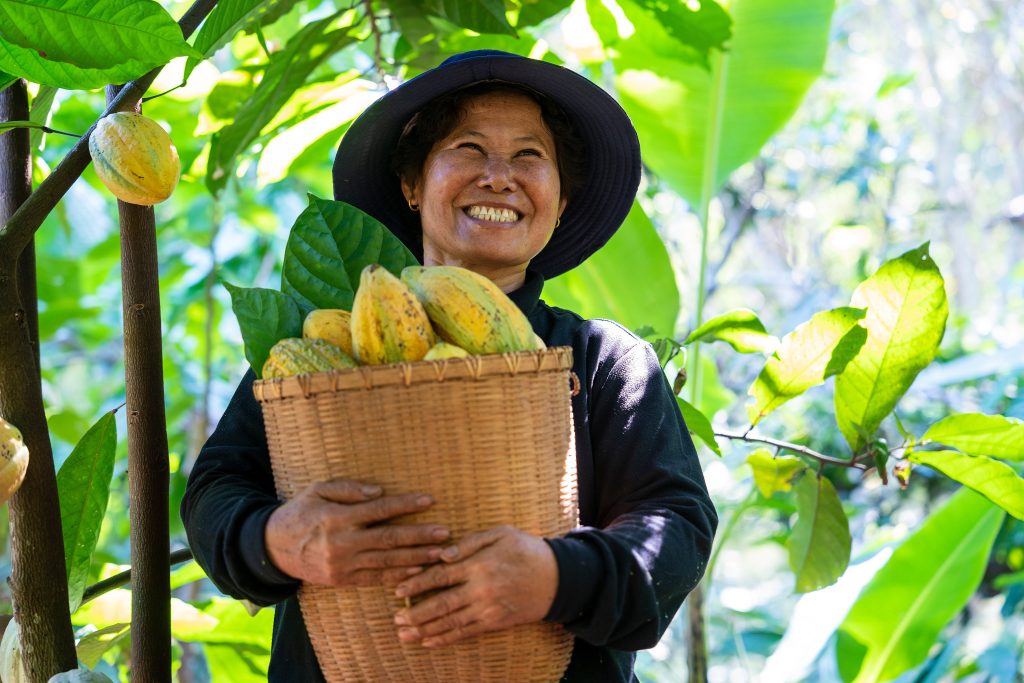Chocolate Slavery: How Organisations and Consumers Can Help End Cocoa Slavery and Support Anti-Slavery Chocolate
Chocolate is one of the world’s most beloved treats, but behind the sweetness lies a harsh and deeply troubling reality: chocolate slavery and the ongoing exploitation of children and vulnerable workers in the cocoa supply chain. While awareness is growing and progress has been made, the fight against cocoa slavery continues with both organisations and consumers having a vital role to play.
A Bitter History of Cocoa Slavery
For decades, the cocoa industry has been plagued by systemic issues, particularly in West Africa, where around 70% of the world’s cocoa is grown. Children as young as five have been reported working long hours on cocoa farms under hazardous conditions. Many are trafficked or forced into labour, often unpaid, due to poverty, lack of access to education, and exploitative supply chains. This is the harsh reality of cocoa slavery.
In 2021, we explored these issues in our blog, “Modern Slavery and Child Labour in the Cocoa Industry”, which outlined how chocolate slavery persists in global supply chains. Since then, there have been important developments, but there is still much work to be done.
Regulatory Momentum Against Chocolate Slavery
Around the world, governments are introducing and strengthening legislation to address human rights abuses in supply chains, including those linked to cocoa slavery. These regulations not only demand transparency but also accountability and proactive risk mitigation from companies.
In Australia, the Modern Slavery Act 2018 requires large entities (over $100 million in annual revenue) to report annually on the risks of modern slavery in their operations and supply chains, as well as actions taken to address those risks. The Act has raised awareness and driven stronger reporting among companies with exposure to anti-slavery chocolate commitments.
In the European Union, the upcoming Corporate Sustainability Due Diligence Directive (CSDDD) will go even further. It will require certain companies to identify, prevent, and remedy adverse human rights and environmental impacts – not just in their own operations, but across their entire value chain. This will apply to many global chocolate producers and retailers sourcing cocoa from high-risk regions.
Other relevant regulations include:
- UK Modern Slavery Act (2015) – Requires companies to publish a Modern Slavery Statement.
- German Supply Chain Due Diligence Act (LkSG) – Enforces due diligence for companies with over 1,000 employees, including in foreign operations.
- U.S. Tariff Act (1930, Section 307) – Prohibits import of goods produced with forced labour, which has already led to actions against cocoa suppliers.
Together, these frameworks are increasing pressure on companies to move from voluntary efforts to mandatory compliance in eliminating cocoa slavery and supporting anti-slavery chocolate production.
The Chocolate Scorecard: A Powerful Anti-Slavery Tool
One of the most valuable tools for tracking progress and holding companies accountable is the Chocolate Scorecard, an initiative by Be Slavery Free. The 6th edition has just been released, evaluating over 60 chocolate companies on their performance across six key categories:
- 1. Traceability & Transparency
- 2. Living Income for Farmers
- 3. Child Labour (including efforts to end cocoa slavery)
- 4. Deforestation & Climate
- 5. Agroforestry
- 6. Chemical Management
The Scorecard highlights both leading companies and those failing to meet ethical standards. It also showcases “Good Egg” award winners – companies recognised for their commitment to anti-slavery chocolate practices and more sustainable cocoa farming.
Whether you’re a business sourcing chocolate or a consumer buying your favourite brand, the Chocolate Scorecard is an invaluable resource for identifying companies working to eliminate chocolate slavery and support human rights.
What Organisations Can Do to Combat Cocoa Slavery
Organisations using cocoa in their supply chains have a responsibility to address and eliminate cocoa slavery. Here’s how:
- Conduct Human Rights Due Diligence (HRDD): Proactively assess and address human rights risks in your supply chain.
- Use the Chocolate Scorecard to assess suppliers and align procurement with your ESG goals.
- Engage suppliers on traceability, certifications, and progress against industry benchmarks.
- Support multi-stakeholder initiatives such as the International Cocoa Initiative (ICI) to promote long-term change.
- Track and report progress using platforms like Informed 365 to maintain transparency and accountability.
Organisations leading the fight against Chocolate Slavery
Tony’s Chocolonely
Tony’s Chocolonely is dedicated to producing 100% slave-free chocolate. The company collaborates directly with farmer cooperatives to maintain a fully traceable supply chain, ensuring transparency and ethical sourcing practices. By paying farmers a living income and committing to long-term purchasing agreements, Tony’s Chocolonely addresses the root causes of child labor and exploitation in the cocoa industry. Read more about their operations here.
Olam International
Olam Cocoa, a subsidiary of Olam International, has partnered with the Fair Labor Association to digitally register nearly 7,000 cocoa farmers and their households in Cameroon. This initiative includes implementing rigorous traceability and reporting systems, educating communities about child labor, and establishing Child Labor Monitoring and Remediation Systems (CLMRS). Olam Cocoa plans to expand this program to cover approximately 223,000 farmers across West Africa.
International Cocoa Initiative (ICI)
The International Cocoa Initiative is a Geneva-based nonprofit organisation funded by major chocolate manufacturers. ICI focuses on addressing child labor in cocoa production in West Africa by collaborating with communities, farmers, unions, the cocoa and chocolate industry, civil society, and national governments. Their efforts aim to improve the lives of children involved in cocoa farming through awareness programs, education, and the implementation of child protection policies.
These organisations exemplify the multifaceted approach needed to eradicate child labor and promote ethical practices in the cocoa supply chain.
How Consumers Can Choose Anti-Slavery Chocolate
Every chocolate purchase is a choice and consumers have more influence than they realise. To support the fight against chocolate slavery, consumers can:
- Check the Chocolate Scorecard before buying chocolate and support high-ranking brands.
- Look for ethical certifications like Fairtrade, Rainforest Alliance, or direct trade models.
- Share information about cocoa slavery and ethical chocolate with your community.
- Advocate for change by supporting policies and groups that promote human rights in global supply chains.
Useful Resources for Awareness and Action
Here are some essential tools and resources to help organisations and consumers take meaningful action:
The Road Ahead: Ending Chocolate Slavery Together
While the 6th edition of the Chocolate Scorecard shows signs of improvement, it also reveals that many companies still need to do more to eradicate cocoa slavery from their supply chains. Change is happening – but it needs to happen faster.
Whether you’re an organisation or a consumer, your choices matter. By demanding anti-slavery chocolate, supporting transparent companies, and pushing for accountability, we can help create an ethical chocolate industry.
Ready to Take Action?
Informed 365’s ESG and modern slavery reporting platform makes it easy to gain transparency across your supply chain, monitor risk, and report with confidence.
Book a demo today to see how Informed 365 can support your anti-slavery goals and help you build a more ethical and sustainable business.
Revisit our original blog on this topic here: Modern Slavery and Child Labour in the Cocoa Industry









